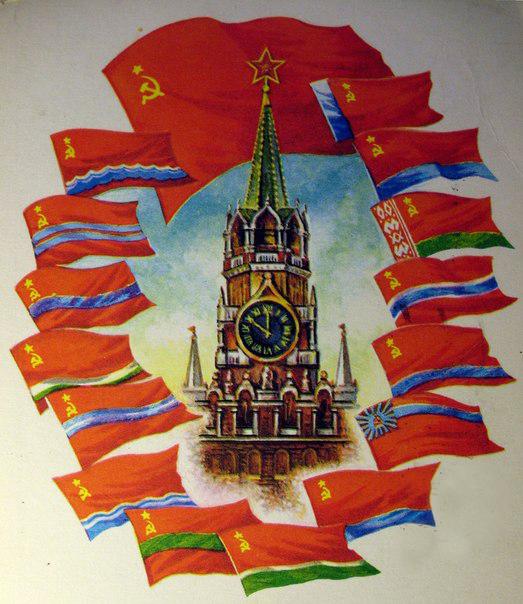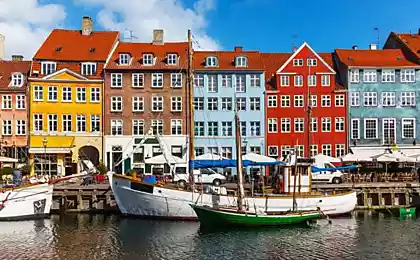497
Lithuania and Moldova, and maybe come back?
American Gallup (Gallup) published the results of a survey conducted among the citizens of the former Soviet republics - as they relate to the disintegration of the USSR. The answer stunned American sociologists. It turns out that only 24% of former Soviet citizens saw this as a positive thing. While 51% felt that the collapse of the Soviet Union caused harm both to them personally, and republics (now independent states), where they lived.

Most experts Gallup struck slice of opinion in Ukraine and Moldova. The "independence" in spite of the Maidan, 56% of respondents have a negative attitude to the disappearance of one great country, and only 23% see this as a benefit. In Moldova, initialed the association agreement with the European Union, where the Constitutional Court declared the official language of Romania, 42% of people continue to see the collapse of the Soviet Union more harm also saw the benefit of 26%. The Russians are also not happy with the "dumping of ballast," as the Soviet Union portrayed the division of some democratic politics: 55% of respondents see it as harmful, only 19% - favor.
Like this. After twenty years of culture isolation (the transition to the Latin alphabet, the feverish search for its own historical roots, leading away from any community with Russia, frantic religious propaganda with a strong admixture of nationalism, the attention of all negative phenomena and events of the past, as well as the problems of the present to the Russian root cause) finally found , something that unites all. This positive attitude to the former unity, and negative - to the modern separatist.
Movement on their own path of development, gradually getting rid of the Soviet legacy, it was for the people of latter-day way of life for the worse. Most of the respondents of former Soviet citizens are disappointed with their post-Soviet rulers and new elites greedy. The lion's share of their promises have not materialized, not only strengthened the nostalgic feelings of the older generation, but also increased the number of fans among the youth of the USSR - they, too, wanted to "fabulous" country called the Soviet Union. And it's not even in the economic shock therapy, which the Liberals treated "shovels" Russia in the nineties. The point total paradigm shift.
In December 2012, the American research organization Pew Research Center released the results of the work devoted to the study of how the citizens of Lithuania, Russia and Ukraine evaluated the changes in 1991, 2009 and 2011. Note reforms in these countries were carried out by different people and in different scenarios. Thus, the emergence of a market economy in 1991, supported by 76%, in 2009 - 50% and in 2011 - already only 45% of the residents of Lithuania, one of the first to escape from the "yoke" of the Soviet economic and political system. According to the respondents, the changes over the last twenty years have been beneficial to politicians (they called 91%) and businesses (78%) rather than ordinary people (20%). 56% of respondents in the country said that the past twenty years had a negative impact on quality of life. Similar responses were 61% Russians and 82% of Ukrainians.
According to the Russian "Levada Center", in 2012 in Russia it was 29% of the supporters of the Soviet political system, and in 2013 - already 36%. At the same time decreased the percentage of supporters of Western democracy (22% vs. 29%). Pollsters also asked what the economic system seems to be more correct to Russians. 51% named a model based on state planning and distribution (in 2012 the figure was 49%). The system, which is based on private property and market relations, in 2012, was supported by only 36%, and next year, and even less - 29%.
And other sociological studies show that more and more Russians are convinced that the cause of the economic difficulties, both past and perhaps ahead of us, was the wrong choice of development path.
Understanding that the collapse of a single state with an economy that can produce everything - from children to the nipple rovers - turned the former Soviet republics in the global periphery service of world capital, it is becoming more widespread. Hence the growth of nostalgic feelings, romanticizing the Soviet Union and the increase in centripetal sentiments expressed interest in the Customs Union and other, closer forms of integration.
Hence, too, and the growing opposition to these sentiments by the main beneficiaries of the dismemberment of the USSR. So, at the Conference on Human Rights in Dublin, December 6, 2012 ahead of a meeting with Russian Foreign Minister Sergei Lavrov, US Secretary of State Hillary Clinton spoke about the Customs Union is quite definitely. "We know what the goal is and we are trying to develop effective ways to slow or prevent this", - she said. So the origin of the color revolutions, "evromaydanov" endless political crises by type Moldova, "Saakashvili phenomena" active work of so-called non-governmental organizations and other such subversive activity - all this is understandable. Global political and economic strategy, the authors are being successfully implemented the concept of planetary globalization, based on the principle of financial and high-tech center - raw periphery, too much made for the demise of the USSR, to prevent its revival in any form.
The reasons that ordinary people with the growing warmth and respect recall the days of the Soviet Union, not only in the economy. Psychologists believe that in this there is a subconscious attempt to find protection from the swollen to epic proportions of the total, including interpersonal, negative. People everywhere have become vicious. Meaner, more aggressive, greedy, selfish, unprincipled, ruthless, selfish, and vlasto-. This, as it turned out, neither build nor to live does not help.
Socialism worked out to develop the best in people. And it's paying off. "Even in the late Soviet period, despite the fact that in times of queues and a shortage of other people perceived as a competitor in the struggle for basic necessities, relations between people - including different nationalities - were quite helpful," - said the deputy director of the Institute of Psychology RAS Andrey Yurevich.
Eastern Europe longs for the socialist camp
Few people know that fondly remember the pre-perestroika times and in countries of the former socialist countries. The most striking were the results of a sociological survey conducted in 2010 by the Institute of Public Opinion Research Emnid in Germany. 80% of the former German Democratic Republic and 72% of respondents in Germany said that could easily and now live in a socialist state. Two decades after the fall of the Berlin Wall and the reunification of Germany, only 28% of respondents in the east of the country said they considered newfound "freedom" a major political value. Leaders of Germany, led by the former East German activist of the Young Communist League (FDJ) Angela Merkel was shocked by these results. Since then, about similar research in Germany is no longer heard. But in other countries, the results are not less eloquent.
Thus, in the ranking of Gallup World, compiled in three categories - "thriving," "struggling" and "suffering" of the people, by the end of 2012 thus became a suffering people of Bulgaria. 39% of its residents identified themselves as unhappy. The top five also included the world's sufferers once thriving Hungarians. 32% of the citizens of this country, which was once envied even in the Soviet Union, too, consider themselves unhappy. Romanians with nostalgia the days of Ceausescu. Similar studies have concluded the same in most states created on the ruins of the Yugoslav federation - says the Serbian edition of the "Politics Online».
Author Vadim Bondar
A source.
Source:

Most experts Gallup struck slice of opinion in Ukraine and Moldova. The "independence" in spite of the Maidan, 56% of respondents have a negative attitude to the disappearance of one great country, and only 23% see this as a benefit. In Moldova, initialed the association agreement with the European Union, where the Constitutional Court declared the official language of Romania, 42% of people continue to see the collapse of the Soviet Union more harm also saw the benefit of 26%. The Russians are also not happy with the "dumping of ballast," as the Soviet Union portrayed the division of some democratic politics: 55% of respondents see it as harmful, only 19% - favor.
Like this. After twenty years of culture isolation (the transition to the Latin alphabet, the feverish search for its own historical roots, leading away from any community with Russia, frantic religious propaganda with a strong admixture of nationalism, the attention of all negative phenomena and events of the past, as well as the problems of the present to the Russian root cause) finally found , something that unites all. This positive attitude to the former unity, and negative - to the modern separatist.
Movement on their own path of development, gradually getting rid of the Soviet legacy, it was for the people of latter-day way of life for the worse. Most of the respondents of former Soviet citizens are disappointed with their post-Soviet rulers and new elites greedy. The lion's share of their promises have not materialized, not only strengthened the nostalgic feelings of the older generation, but also increased the number of fans among the youth of the USSR - they, too, wanted to "fabulous" country called the Soviet Union. And it's not even in the economic shock therapy, which the Liberals treated "shovels" Russia in the nineties. The point total paradigm shift.
In December 2012, the American research organization Pew Research Center released the results of the work devoted to the study of how the citizens of Lithuania, Russia and Ukraine evaluated the changes in 1991, 2009 and 2011. Note reforms in these countries were carried out by different people and in different scenarios. Thus, the emergence of a market economy in 1991, supported by 76%, in 2009 - 50% and in 2011 - already only 45% of the residents of Lithuania, one of the first to escape from the "yoke" of the Soviet economic and political system. According to the respondents, the changes over the last twenty years have been beneficial to politicians (they called 91%) and businesses (78%) rather than ordinary people (20%). 56% of respondents in the country said that the past twenty years had a negative impact on quality of life. Similar responses were 61% Russians and 82% of Ukrainians.
According to the Russian "Levada Center", in 2012 in Russia it was 29% of the supporters of the Soviet political system, and in 2013 - already 36%. At the same time decreased the percentage of supporters of Western democracy (22% vs. 29%). Pollsters also asked what the economic system seems to be more correct to Russians. 51% named a model based on state planning and distribution (in 2012 the figure was 49%). The system, which is based on private property and market relations, in 2012, was supported by only 36%, and next year, and even less - 29%.
And other sociological studies show that more and more Russians are convinced that the cause of the economic difficulties, both past and perhaps ahead of us, was the wrong choice of development path.
Understanding that the collapse of a single state with an economy that can produce everything - from children to the nipple rovers - turned the former Soviet republics in the global periphery service of world capital, it is becoming more widespread. Hence the growth of nostalgic feelings, romanticizing the Soviet Union and the increase in centripetal sentiments expressed interest in the Customs Union and other, closer forms of integration.
Hence, too, and the growing opposition to these sentiments by the main beneficiaries of the dismemberment of the USSR. So, at the Conference on Human Rights in Dublin, December 6, 2012 ahead of a meeting with Russian Foreign Minister Sergei Lavrov, US Secretary of State Hillary Clinton spoke about the Customs Union is quite definitely. "We know what the goal is and we are trying to develop effective ways to slow or prevent this", - she said. So the origin of the color revolutions, "evromaydanov" endless political crises by type Moldova, "Saakashvili phenomena" active work of so-called non-governmental organizations and other such subversive activity - all this is understandable. Global political and economic strategy, the authors are being successfully implemented the concept of planetary globalization, based on the principle of financial and high-tech center - raw periphery, too much made for the demise of the USSR, to prevent its revival in any form.
The reasons that ordinary people with the growing warmth and respect recall the days of the Soviet Union, not only in the economy. Psychologists believe that in this there is a subconscious attempt to find protection from the swollen to epic proportions of the total, including interpersonal, negative. People everywhere have become vicious. Meaner, more aggressive, greedy, selfish, unprincipled, ruthless, selfish, and vlasto-. This, as it turned out, neither build nor to live does not help.
Socialism worked out to develop the best in people. And it's paying off. "Even in the late Soviet period, despite the fact that in times of queues and a shortage of other people perceived as a competitor in the struggle for basic necessities, relations between people - including different nationalities - were quite helpful," - said the deputy director of the Institute of Psychology RAS Andrey Yurevich.
Eastern Europe longs for the socialist camp
Few people know that fondly remember the pre-perestroika times and in countries of the former socialist countries. The most striking were the results of a sociological survey conducted in 2010 by the Institute of Public Opinion Research Emnid in Germany. 80% of the former German Democratic Republic and 72% of respondents in Germany said that could easily and now live in a socialist state. Two decades after the fall of the Berlin Wall and the reunification of Germany, only 28% of respondents in the east of the country said they considered newfound "freedom" a major political value. Leaders of Germany, led by the former East German activist of the Young Communist League (FDJ) Angela Merkel was shocked by these results. Since then, about similar research in Germany is no longer heard. But in other countries, the results are not less eloquent.
Thus, in the ranking of Gallup World, compiled in three categories - "thriving," "struggling" and "suffering" of the people, by the end of 2012 thus became a suffering people of Bulgaria. 39% of its residents identified themselves as unhappy. The top five also included the world's sufferers once thriving Hungarians. 32% of the citizens of this country, which was once envied even in the Soviet Union, too, consider themselves unhappy. Romanians with nostalgia the days of Ceausescu. Similar studies have concluded the same in most states created on the ruins of the Yugoslav federation - says the Serbian edition of the "Politics Online».
Author Vadim Bondar
A source.
Source:























